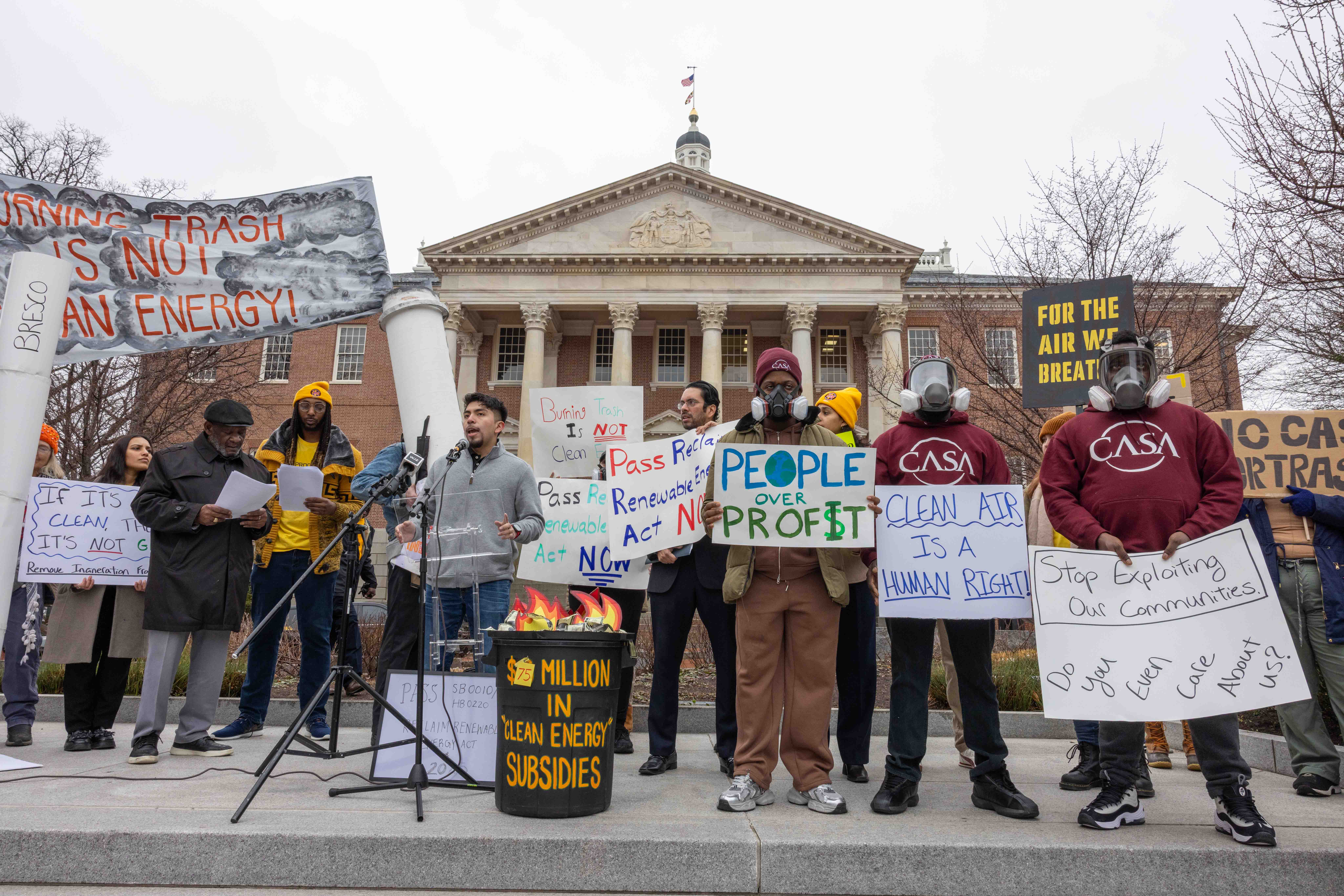
Long demanded by community leaders on the frontlines of fighting incinerators in Maryland, this policy will end state subsidies and greenwashing for polluting trash incinerators and redirect those investments toward renewable energy. Maryland has become the second state in the country, behind only California, to delete trash incineration from its Renewable Portfolio Standard.
The Maryland General Assembly has passed legislation ending Maryland’s misclassification of trash incineration as “renewable energy.” By deleting “waste-to-energy” and “refuse-derived fuel” from the state Renewable Portfolio Standard, Maryland will end its practice of subsidizing companies that burn trash by millions of dollars per year, redirecting those funds toward investments in renewable energy.
Communities on the frontlines of incineration in Maryland have been campaigning for this change for over a decade. In 2011, the General Assembly and then-Governor O’Malley moved to put trash incineration in the top tier of Maryland’s Renewable Portfolio Standard, joining genuinely renewable resources like wind and solar. Although decades-old incinerators already existed in Maryland, this change was motivated by elected officials’ support of the construction of new trash incinerators proposed at the time in Frederick County and Baltimore City, which were ultimately defeated by community opposition in 2014 and 2016.
“Me and my fellow community members in South Baltimore can breathe just a little easier knowing we will no longer pay trash incinerators to pollute our air,” said Carlos Sanchez, Youth Outreach Specialist with South Baltimore Community Land Trust. “We made our voices heard for over a decade explaining that burning limited natural resources is not clean energy and we have been heard.”
“Eliminating trash incineration from Maryland’s Renewable Portfolio Standard is a tremendous and long-demanded environmental justice victory,” said Jennifer Kunze, Maryland Program Director with Clean Water Action. “It’s fiscally smart in a tough budget year. This correction of state policy will stop Maryland electricity ratepayers wasting millions of dollars a year on something that just doesn’t deliver what the Renewable Portfolio Standard was meant to provide: clean, renewable energy. It will help to support the development of Zero Waste infrastructure by making it easier for composting, reuse and recycling, and other healthier solid waste management practices to compete without fighting uphill against state subsidies supporting the worst solid waste management option.”
"This crucial step is the culmination of years of tireless advocacy and hard work by numerous groups committed to a healthier and more sustainable future for all Marylanders," said Jeff Barnes, Member of Progressive Maryland. "For too long, this false premise has diverted critical public resources away from genuine renewable energy solutions. The removal of this outdated designation marks a pivotal moment in Maryland's commitment to environmental stewardship and demonstrates the power of collective action in achieving meaningful policy change. We look forward to a future where investments are strategically directed towards real solutions that benefit both our environment and the well-being of all Maryland residents."
The Renewable Portfolio Standard, a tool used by many states to support renewable energy generation, requires utilities to subsidize renewable energy generators with funding from electricity customers by purchasing Renewable Energy Credits from qualified renewable energy sources. Because Maryland misclassified trash incineration as “renewable energy,” millions of dollars of ratepayer money per year, escalating over time, have been wasted subsidizing trash incinerator companies that operate on Maryland’s regional grid. In the last four years (between 2020 and 2023), Maryland wasted $75 million subsidizing three trash incinerators, with the largest share going to ReWorld for its out-of-state incinerator in Lorton, VA.
The two in-state incinerators currently subsidized by Maryland’s Renewable Portfolio Standard are located in Baltimore City and Montgomery County. Both the Baltimore City (Mayor, Comptroller, and Council) and Montgomery County governments testified in support of eliminating trash incineration from Maryland’s Renewable Portfolio Standard this year, and both local governments have made commitments to transition away from trash incineration. 78 organizations from across Maryland, across the climate, environment, environmental justice, and Zero Waste sectors, reinforced the frontline community calls demanding this policy change. Reclaim Renewable Energy Act sponsors Delegate Stewart (D - Montgomery County), Senate President Ferguson (D - Baltimore City), Senator Lewis Young (D - Frederick County), and Senator Simonaire (R - Anne Arundel County) played a critical role in supporting and reinforcing this campaign.
Trash incinerators are not renewable or clean energy. A 2023 peer-reviewed study found that incinerators emit more greenhouse gas emissions per unit of electricity they put on the grid than any other power source, even coal plants. Incinerators are also major sources of health-harming air emissions including dioxins, lead, mercury, nitrogen and sulfur oxides, and particulate matter. While many states include trash incineration in their Renewable Portfolio Standard policies, and others do not, California has previously eliminated trash incineration from its Renewable Portfolio Standard. With this victory, Maryland becomes the first state on the East Coast and the second state in the country to delete trash incineration from its Renewable Portfolio Standard.